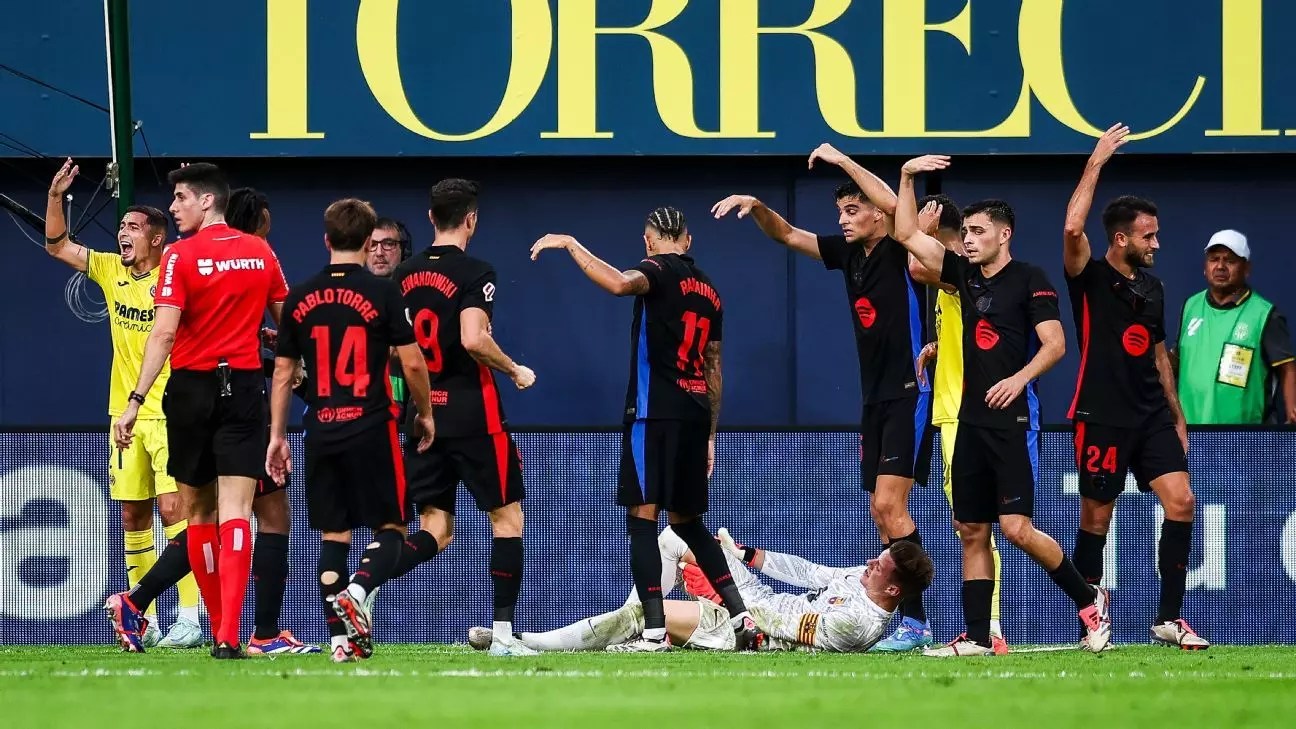The excitement of a dominant performance on the football pitch often masks the underlying threats lurking within the game. For FC Barcelona, that mask was ripped away during their emphatic 5-1 victory over Villarreal, as goalkeeper Marc-André ter Stegen sustained what appears to be a severely distressing knee injury. The severity of this incident is not just a misstep in a match; it casts a shadow over Barcelona’s promising LaLiga season. With reports suggesting that he could be sidelined for up to eight months, the implications stretch far beyond the loss of a key player.
Ter Stegen’s exit came right at the end of the first half, following what initially seemed a routine action of claiming a corner. However, the gravity of the injury soon became apparent as he collapsed, and immediate measures were taken to transport him to a nearby hospital. Head coach Hansi Flick’s subsequent comments hinted at the seriousness of the matter, reflecting on the challenge this injury presents for the club moving forward.
The ramifications of Ter Stegen’s potential absence can’t be understated. At 32 years of age, the German international is not just a shot-stopper; he is a leader and a linchpin in Barcelona’s defensive setup. Flick characterized the nature of the injury as “huge and serious,” leaving fans and analysts alike to ponder how this will affect the team’s overall dynamic. If Ter Stegen is indeed out for the remainder of the season, Barcelona would face the challenge of fostering a new rhythm and adapting their game plan without their first-choice goalkeeper.
Moreover, he joins an already lengthy injury list that includes numerous other first-team regulars such as Ronald Araújo and Frenkie de Jong. These injuries raise questions about depth, resilience, and the ability to maintain high performance levels throughout the season. Flick has shown faith in youth; however, relying on inexperienced players during critical matches can be a double-edged sword.
Despite these setbacks, Barcelona remains in a strong position within LaLiga, holding onto the top slot with six victories from six matches thus far. This resilience can be attributed to Flick’s tactical versatility and his willingness to integrate younger talents. The match against Villarreal became a prime example of this with players like Sergi Domínguez and Pablo Torre being thrust into positions during a high-stakes game.
With a notable brace from Robert Lewandowski further solidifying his place as a crucial player, Barcelona still managed to deliver a performance that dazzled, albeit temporarily overshadowed by Ter Stegen’s injury. The balance of experienced leadership and youthful exuberance seems to be working well, but how long can this hold when injuries continue to deplete the squad?
Flick’s approach emphasizes positivity amid adversity. In the aftermath of Ter Stegen’s injury, he emphasized the importance of a unified team spirit. He recognized the compelling mix of young talent and seasoned professionals, remarking on the steadfast character displayed by his players. This resilience will be put to the test as they navigate upcoming fixtures without one of their crucial team members.
The coach further addressed the need for safeguarding all players, particularly highlighting the rough challenges faced by younger players like Lamine Yamal. It’s vital for a team to protect its emerging stars, particularly in high-pressure environments. Flick’s focus on nurturing this talent while maintaining competitiveness will be the bedrock as Barcelona journeys through this phase of unexpected challenges.
The journey ahead for Barcelona, while promising, is riddled with hurdles. Ter Stegen’s unfortunate injury signifies more than just the loss of a player; it challenges the very fabric of the team’s strategy and cohesion. As the club navigates through the turbulent waters of injuries and competitive fixtures, the ability to adapt and innovate becomes paramount.
Flick’s faith in his players and the team’s potential to emerge resilient will be crucial. Barcelona must transform this period of adversity into an opportunity for growth, harnessing the strengths of their squad while embracing the next generation of talent. The coming months will reveal whether they can hold onto their winning form and triumph against the odds set before them.


Leave a Reply